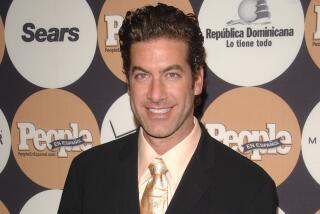Older Writers Squeezed Out of Hollywood
Writing jobs in today’s youth-obsessed Hollywood are increasingly going to young, usually white, males as writers 50 years and older are virtually shut out from many of the top film and television assignments, according to a study to be released today by the union representing writers.
The study, which is the first look in five years at who writes today’s TV shows and movies, does find that women and minority writers have made gains in Hollywood over the past decade, especially in narrowing the pay gap with white male counterparts. But the percentage of work available to them remains relatively low, according to the study commissioned by the West Coast branch of the Writers Guild of America.
However, it’s the age issue that is becoming especially acute, the study shows. In a profession where high unemployment is the norm even in the best of times, more than seven in 10 TV and film writers under age 30 had jobs in 1997, but less than one in three writers age 50 or older could make the same claim. About 77 television series last season had no writers over age 50, the study found, with such prime-time shows as “Friends” and “Veronica’s Closet” relying exclusively on writers under age 40.
The study of writers receiving on-screen credits, coauthored by sociologists William and Denise Bielby from UC Santa Barbara, documents a substantial erosion in job opportunities for older writers as “the premium placed on a younger audience continues to typecast older writers.” Ten years ago, nearly half of the writers in their 50s were employed. Today, the number is 32%. A decade ago, four out of 10 writers in their 60s worked, compared with one in five today.
“While older, experienced writers were once the most highly paid in the industry, changing market dynamics since the early 1980s have made writers in their 30s the ones most highly valued by the industry,” the study concludes.
The results mirror the experiences of writers like Burt Prelutsky, who in his 30s and 40s wrote for some of biggest programs in TV history, among them “M*A*S*H” and “‘The Mary Tyler Moore Show.”
Now 58, his name these days is usually found in the credits of a few cable TV episodes, if it all.
“When I was 49, I was doing fine,” Prelutsky said. “When I hit 50, it was like someone went to the faucet and turned off the tap.”
The report comes amid one of Hollywood’s stranger age-related incidents. Earlier this month, “Felicity” writer Riley Weston, ballyhooed as a hip 19-year-old talent, was unmasked as a 32-year-old former actress. Although she has gained little sympathy in Hollywood for her deception, the incident shows how obsessed Hollywood is in finding writers in tune with the much-sought young audience.
The report’s brightest spot shows the narrowing pay gap by women and minorities with white male counterparts. In the 1980s, the study says, the median earnings for white males was about double that of minority writers. During the 1990s, the gap has nearly closed. For women, the gap in TV pay for writers is closing, although a gulf remains for film writers.
But despite pay advances, the amount of work for women and minorities remains relatively low and growth is flat.
Only 23% of Hollywood’s writing assignments went to women last year, barely up from 21% a decade ago. Only one in six film writers were women. The percentage of women writers in film and TV has not increased since 1991.
Last season, shows such as “The X-Files,” “Frasier” and “The Pretender” had one or no female writers receiving on-screen credit, with the same true for late-night shows “Politically Incorrect” and “The Tonight Show.” Only a handful of shows defied the trend, notably “Touched by an Angel,” where more than two-thirds of the writers were women.
The study reports that minority writers made some employment gains in the 1990s, but remain a small factor in Hollywood. Just 7% of employed TV writers were minorities, and only 5% were feature film writers.
Executives representing studios and producers were reluctant to comment on the findings, although some said that writers and agents share blame with studios and producers. Some noted the irony that many of the executive producers who hire writers are writers themselves, as well as members of the same guild now drawing attention to the lack of diversity in hiring.
What employment opportunities are developing have mostly been with TV shows on newer, upstart networks that frequently specialize in so-called urban comedies aimed at African American audiences.
Minority writers accounted for as many as 29% of the writers on the UPN network, with 19% on the WB and 13% on Fox. In contrast, just 3% of writers who got credit on shows for ABC, CBS and NBC were minorities. In addition, 80% of 168 TV series analyzed in the study had one or no minority writers during the past season.
“For black writers, there still is the problem of being pigeonholed into newer networks that build themselves on black programming. And it’s not even necessarily good black programming, but often stereotyped black programming,” said Sharon Johnson, an African American writer whose credits include “The Sinbad Show” and “Good Behavior.”
Latino writers also complain of being confined into writing for ethnic characters, which limits job opportunities.
The report concludes pessimistically, however, that barriers are institutionalized and will be difficult to change, especially with such an emphasis on attracting young audiences, the relatively low number of women and minorities in decision-making positions, and because decisions about hiring writers are highly subjective by nature.
“It’s particularly difficult to talk about employment statistics in the arts when you’re dealing with high unemployment to begin with, and qualifications that are totally nebulous and based on artistic accomplishment,” said Daniel Petry Jr., president of Writers Guild of America, West.
More to Read
The biggest entertainment stories
Get our big stories about Hollywood, film, television, music, arts, culture and more right in your inbox as soon as they publish.
You may occasionally receive promotional content from the Los Angeles Times.










